北师大高二英语选修六 Unit16 Lesson 3 (经典终极版本)
北师大版高中英语选修6 Unit16_Lesson3_名师教学设计
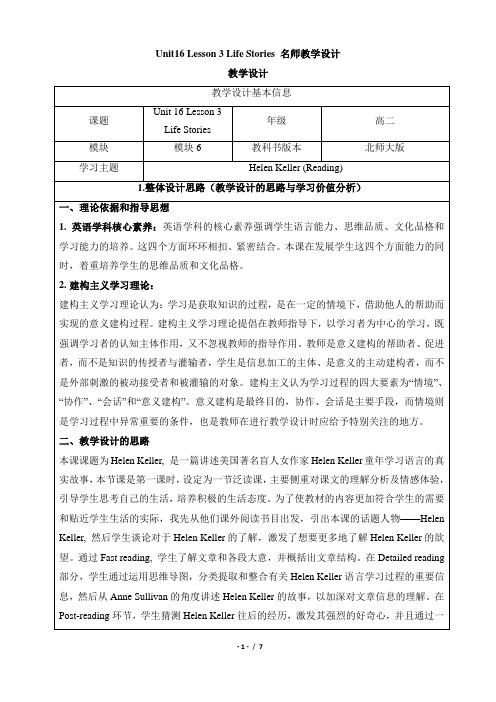
5.教与学的过程设计(课堂教与学的每个步骤的情境任务及其意图分析)
教学环节
教师活动
学生活动
设计意图
Lead-in
1.Ask Ss whether they like reading and what kind of books they often read.
To let Ss figure out the main ideas of the paragraphs and analyze the structure of the passage.
Detailed reading
1.Ask Ss to read part 1(para1-2) and answer the questions:
2. Watch the video to find out what happened to Helen later. They will be shocked and touched to find out that Helen even learned how to speak.
To let Ss know about Helen Keller’s later life experiences and success.
(Objective 1)
3. Ask Ss to retell Helen’s story from Anne Sullivan’s perspective.
3. Retell Helen’s story from the perspective of Anne Sullivan.
To let Ss practice expressing the sorted up information orally and get familiar with the content of the text.
北师大版选修六Unit16_lesson3_Life_Stories课件
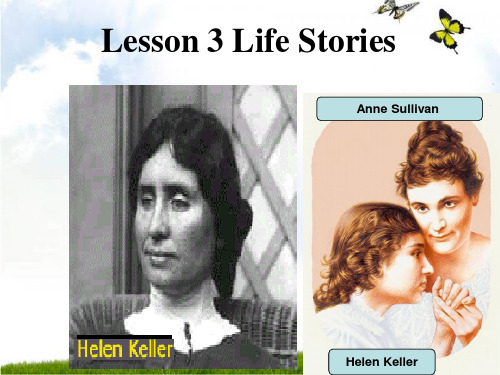
water
Anne Sullivan let Helen
____p_la_y__w_i_th____ the doll and __sp_e_l_le_d__ the letters into __h_e_r_h_a_n_d__________.
Anne let water ___f_lo_w___ over one of ______H_e_l_e_n_’s_h_a_nadnsd _____s_p_e_ll_e_d the letters into
Lesson 3 Life Stories
Anne Sullivan
Helen Keller
Heleh keller ( American idol )
Keep your face to the sunshine ,and you will not see the shadow .
Do you know Helen Keller?
答案:D
______ I explained on the phone,your request will be considered at
t4h2e next meeting.
A.When
B.After
C.As
D.Since
解析:本题考查as引导的非限制性定语从句,根据句意“就像我电话里
解释的一样”,选as。
【归纳拓展】 as作连词的用法: (1)作“当……的时候”,引导时间状语从句。注意与when, while的用法区别。 ① when作“当……的时候”解,可以指较短的(一点)时间,也 可指一段时间,即非延续性动词。 When he was at college,he could speak several foreign languages. When the clock struck twelve,all the lights in the street went out. ② while常表示一段较长的时间或一个过程,即延续性动词。
北师大版选修六Unit16-lesson3-知识点总结归纳复习资料大全[PPT课件白板课件]精品可编辑
![北师大版选修六Unit16-lesson3-知识点总结归纳复习资料大全[PPT课件白板课件]精品可编辑](https://img.taocdn.com/s3/m/4b4e23fb284ac850ad0242e6.png)
(3)as=in the way that,作“像”“按照……的方式”解,引导 方式状语从句。 He speaks English as Americans do. Remember,you must do everything as I do. (4)用于as...as...或not so/ as...as...中,前一个as是副词,后一个as 是连词,引导比较状语从句。 They helped the old man as often as possible. I don’t speak English so/ as well as he does. (5)作“虽然”“尽管”解,引导让步状语从句。常用倒装语序, 即adj./adv./n.+as +主语+谓语+主句。 Tired as they were,they walked on.Child as he is,he knows a l ot.(child前不用冠词)
(every)now and then时常,偶尔,不时 just now刚才 from now on从现在开始,今后 for now目前,眼下 Snakes come near the house now and then... 有几条蛇时不时地爬到屋子边上来…… That’s all for now.眼下就这些。
now that既然(接条件状语从句),that可省略,与since用法相同。 Now (that) you mention it,I do remember the incident. 既然你提到了它,我想起那件事了。 Now you’ve passed your test,you can drive on your own. 现在你驾驶考试已经合格,你可以独自开车了。
(2009年陕西卷)This is the first time we________a film in the ci nema together as a family.
高中英语:Unit16 lesson3 Life Stories名师公开课精品课件(北师大版选修6)
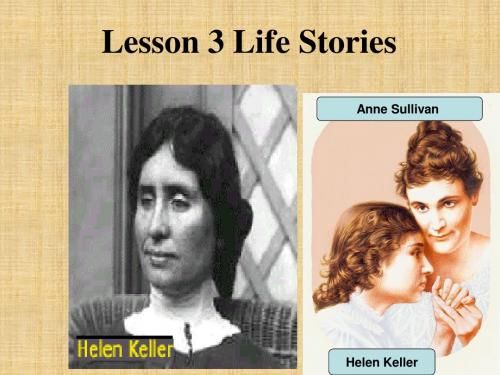
Anne Sullivan
Helen Keller
Helen Keller (June 27, 1880 - June 1, 1968), was an author, lecturer, and humanitarian whose unusual life and dedicated (献身的) work had an international influence on the lives of the disabled (残疾人). She became blind and deaf at the age of 19 months through a damaging brain fever and could communicate only through hysterical (歇斯 底里) laughter or violent tantrums (发怒). But, with the help of her teacher Anne Sullivan, Keller learned to read braille(盲文) and to write by using a special typewriter. Bibliography自传:
What do you think of behavior?
troublesome
trouble + some
unbearable
un + bear + able (v.) stub+born (香ห้องสมุดไป่ตู้或铅笔的) 残根,殘头
stubborn
1 A __________ stubborn person does not like to change his/her idea. 2 A ____________ troublesome person will cause a lot of trouble. 3 An _____________ unbearable person is one that people cannot stand.
北师大版高中英语选修6 Unit16_Lesson3_公开课教学设计(二)
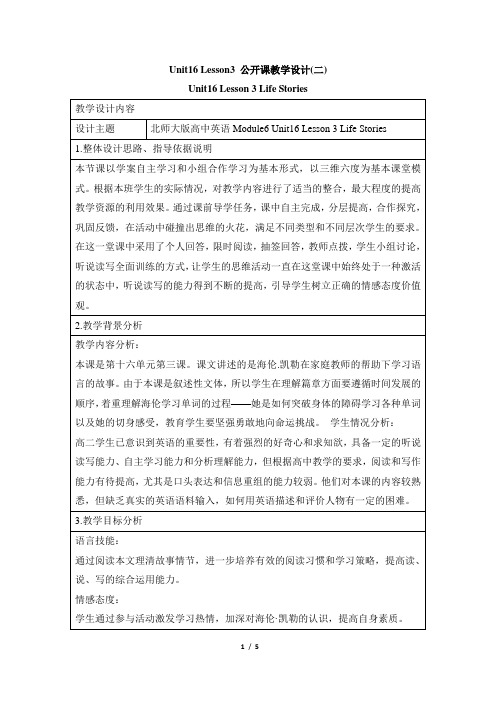
4.了解或模仿HelenKeller的习字过程。(小组自主选择任务项。)
通过主动获取信息、建构关于课文的相应图式知识,熟悉话题
课中
导入
Step1
TaskstheSstosharewhattheyknowaboutHelenKeller.
通过小组导学任务展示自然进入话题,激活背景知识,同时培养学生的实践性能力。
课文前两段背景文字生词密集,先让学生阅读,可为后面的情节做铺垫,同时复现生词。建立词汇库帮助学生更好地理解文中人物。
Step5
SsscantherestofthetexttofindoutthewordsHelenlearned.
TasksSstotellthedifferencesbetweendoll&waterandlove&think.
Unit16 Lesson3公开课教学设计(二)
Unit16Lesson3LifeStories
教学设计内容
设计主题
北师大版高中英语Module6Unit16Lesson3LifeStories
1.整体设计思路、指导依据说明
本节课以学案自主学习和小组合作学习为基本形式,以三维六度为基本课堂模式。根据本班学生的实际情况,对教学内容进行了适当的整合,最大程度的提高教学资源的利用效果。通过课前导学任务,课中自主完成,分层提高,合作探究,巩固反馈,在活动中碰撞出思维的火花,满足不同类型和不同层次学生的要求。在这一堂课中采用了个人回答,限时阅读,抽签回答,教师点拨,学生小组讨论,听说读写全面训练的方式,让学生的思维活动一直在这堂课中始终处于一种激活的状态中,听说读写的能力得到不断的提高,引导学生树立正确的情感态度价值观。
高二英语 模块6 Unit 16 Lesson 3 Life Stories-reading课件1 北师大版选修6

Read and find out the examples of words Helen learned.
water; doll; think; love
• What’s the difference among the four words “water; doll; think; love”
Pre-reading
What were her problems?
couldn’t see couldn’t hear
• blind = (severe ) restrictions • deaf couldn’t speak; read
couldn’t communicate
Reading strategy: prediction
What success did she achieve in her life?
Learning Objectives
• In this period, you will be able to 1. Learn to use some useful reading strategies: • to predict the general idea • to guess unknown words from the context. 2. Find out detailed information in the text.
a. Look at the title----
Helen Keller
b. look at the pictures c. Read the first couple of lines:
Helen Keller was a very special girl who needed a superb teacher. By the time she was seven years old, she still couldn’t speak, read or write.
北师大版选修6 Unit 16 -Lesson3 Life Stories--1 reading

What success did she achieve in her life?
Reading strategy: prediction
• Before reading, look at the title, pictures • Read the first two or three lines of the text. • Try to guess what the text is going to be about
“The best and most beautiful things in the world cannot be seen nor touched but are felt in the heart.”
Pre-reading
What were her problems?
couldn’t see couldn’t hear
While-reading
doll; Group 1: water
think; Group 2: love
(complex words) (object words) sth. you can touch hard to show;
Game (Pair work ): • One closes the eyes • The other spells a word into the hand of your partner, asking him/her to tell the word. • See if your partner can tell the word?
Period 1: Reading
ቤተ መጻሕፍቲ ባይዱ
Learning Objectives
• In this period, you will be able to 1. Learn to use some useful reading strategies: • to predict the general idea • to guess unknown words from the context. 2. Find out detailed information in the text.
Unit 16 Lesson 3 课文课件-高中英语北师大版选修六
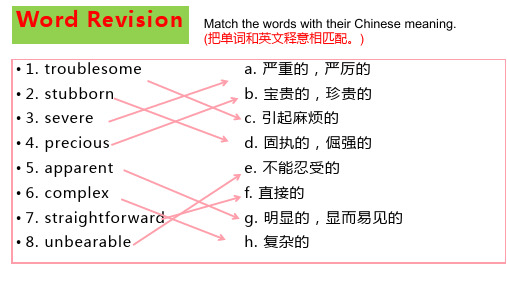
Love was something you Helen's amaczoiunlgd rneostutlotusch but it couunldderstanding
make you happy and let you
feel the slwoeveetness inunldifeers.tood the truth
Her teacher Sullivan's help.
Homework
Think about what you have learned from Helen’s story, and write an assay about 100 words.
7.Para. 10-11 f. How Helen learned the word think.
Structure reading
Structure of the text
• PPaarrat. 1 B(Pacakragr.1ou-2nd) BinafocrkmgartoiounnadboinuftoHremleantiKoenllaerbout • Para. 2 BaHckegleronuKndeilnleforrmanadtioAnnanbeouSt uAlnlinveaSnullivan
• Para. 9 How Helen learned the word “think” • Para. 10-11 How Helen finally learned the word “love”
Detailed reading
Part 1(para. 1&2): Background information
• She was a teacher and former student at a school for the blind;
北师大版英语高二选修六 Unit 16 Lesson 3 Life Stories Vocabulary 课件 (共37张PPT)

Vocabulary of synonyms and opposites
Task 6: Complete the story Peter and Paul with the vocabulary of synonyms and opposites in task 4 and task 5.
Vocabulary of synonyms and opposites
uncertain about how…
not sure
Vocabulary about life stories
adjectives to describe a thing
severe restrictions
serious
precious knowledge
valuable and important
Summary: strategies to build up vocabulary
1. Build up the vocabulary about a topic, e.g. life stories. 2. Build up the vocabulary as collocations, e.g. verb phrases and adjective + noun phrases, so that you can use them properly in your writing.
Vocabulary about life stories
More verb phrases from the text.
• lead somebody to do something
• keБайду номын сангаасp on trying
• feel the warmth of something try hard to improve or
北师大版高中英语选修6-Unit16课件U16-L3-3
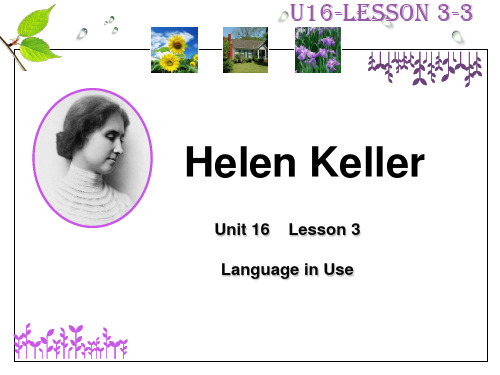
First-person Quotation
monkey-like imitation (line 26-27) a few early violets (line 50) put her arm gently round me (line 52) half in words, half in signs (line 59-60) in a flash (line 76) you feel the sweetness that it pours into
4 I like to be very _s_t_ra_i_g_h_tf_o_r_w_a_r_d___ (direct) when I talk about problems but my mother doesn’t like that. (para.3)
Ex. 3: Synonyms
5 We wanted to enter the contest but we couldn’t because there were lots of _r_es_t_ri_c_ti_o_n_s_ (limits). (para.1)
4 He was _u_n_ce_r_t_a_in__ (certain) of the correct date so he said he’d find out. (para.10)
Ex. 4: Opposites
5 Some people think small children are _t_ro_u_b_l_es_o_m_e__ (enjoyable) but I just love them! (para.2)
U16-Lesson 3-3
Helen Keller
Unit 16 Lesson 3 Language in Use
北师大高中英语选修六高二英语模块6Unit16Lesson3LifeStories-reading课件

became a teacheWr?hat does “former” mean?
She needed to stop Helen’s troublesome behaviour first.
• What did Anne Sullivan need to do first to prepare Helen to learn language?
love
Mistakes … head … spell …
first time … abstract
• What do you think happened later to Helen Keller?
• Find it out on page 100.
Homework
Write a summary of the story in about 100 words based on
think
—————————— It was the first time she
—
had understood an
love
(the 2nd She felt the meaning of
time)
“love” was
beautiful.
Sheakbnsetwrachterwtoeardch. er loved her and how to express her own feelings.
Brainstorming
• Imagine you are Miss Sullivan, and discuss in groups how you can teach the following words to Helen:
love water think
Unit 16 Stories—Lesson 3《Life Stories》教案(北师大选修6)
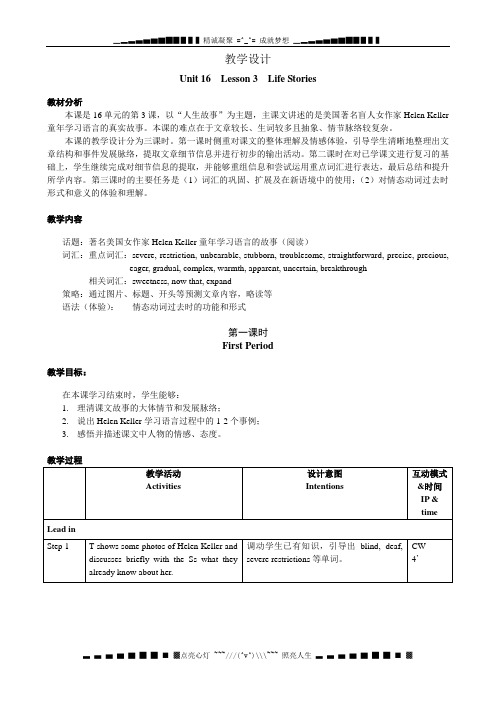
教学设计Unit 16 Lesson 3 Life Stories教材分析本课是16单元的第3课,以“人生故事”为主题,主课文讲述的是美国著名盲人女作家Helen Keller 童年学习语言的真实故事。
本课的难点在于文章较长、生词较多且抽象、情节脉络较复杂。
本课的教学设计分为三课时。
第一课时侧重对课文的整体理解及情感体验,引导学生清晰地整理出文章结构和事件发展脉络,提取文章细节信息并进行初步的输出活动。
第二课时在对已学课文进行复习的基础上,学生继续完成对细节信息的提取,并能够重组信息和尝试运用重点词汇进行表达,最后总结和提升所学内容。
第三课时的主要任务是(1)词汇的巩固、扩展及在新语境中的使用;(2)对情态动词过去时形式和意义的体验和理解。
教学内容话题:著名美国女作家Helen Keller童年学习语言的故事(阅读)词汇:重点词汇:severe, restriction, unbearable, stubborn, troublesome, straightforward, precise, precious, eager, gradual, complex, warmth, apparent, uncertain, breakthrough相关词汇:sweetness, now that, expand策略:通过图片、标题、开头等预测文章内容,略读等语法(体验):情态动词过去时的功能和形式第一课时First Period教学目标:在本课学习结束时,学生能够:1.理清课文故事的大体情节和发展脉络;2.说出Helen Keller学习语言过程中的1-2个事例;3.感悟并描述课文中人物的情感、态度。
*表示可灵活处理的活动。
第二课时Second Period 教学目标在本课学习结束时,学生能够:1.运用所学单词和短语描述Helen的学习语言的过程;2.讨论Helen和/或Anne成功的原因;*表示可灵活处理的活动。
北师大版高中英语选修6 Unit16 Lesson 3知识点归纳

Lesson 3知识点归纳I. Phrases:1. be severe on sb. / be strict with sb.2. bring in3. the former…the latter…4. relate to…5. open up6. now thatfor / about sth.7. be eager to do sth.for sb. to do sth.8. expand into…9. It is c lear/obvious/apparent that…10. in a flash11. give sb. a hug12. a burst of understanding13. keep on doing14. be uncertain about…15. come outII. Useful sentences:1.By the time when we got to the station, the train had left.2.It was apparent that t he boy wasn’t interested in study.3.Living in the mountain village is an important experience for my work in thefuture.4.It was the first time that she had been at a summer school.5.He didn’t go to school. This was because he was ill.6.Great changes have taken place in china since the Reform and Opening-up.7.With the boy leading the way, we had no difficulty finding her home.8.Now that you have finished your work, you’d better have a rest.9.The doctor did as much as he could to save the patient.10.Without love (= I f you didn’t have love), you would not be happy or wantto play.。
